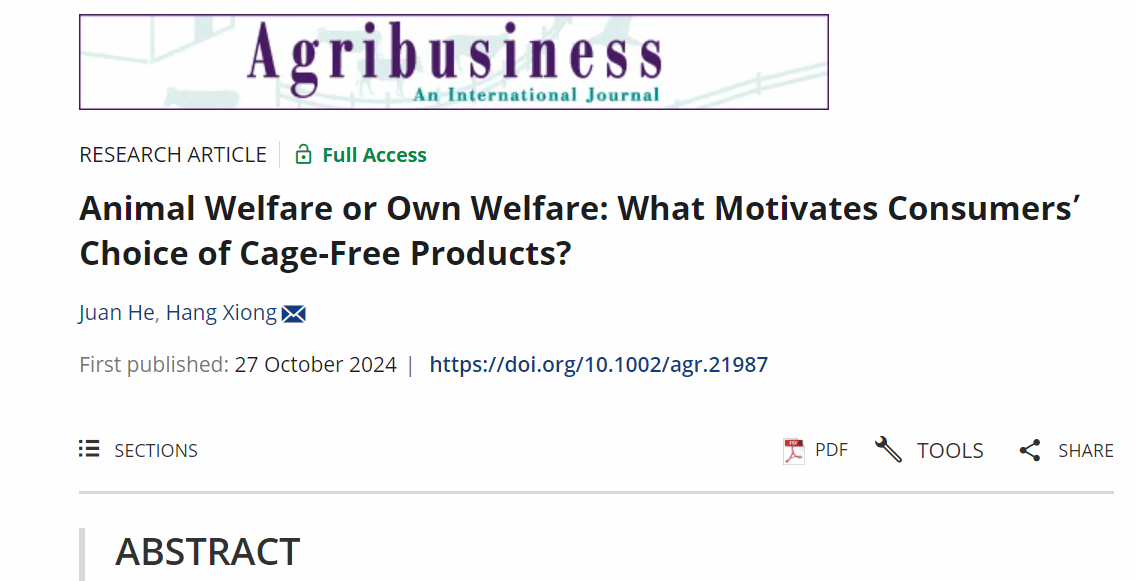经济系贺娟副教授和熊航教授最新合作论文《Animal Welfare or Own Welfare: What Motivates Consumers’ Choice of Cage-Free Products?》于近日发表于国际农商经济管理领域著名杂志《Agribusiness: an International Journal》。

摘要
This study addresses the puzzle of animal welfare regulations consistently passing by majority votes, despite potential welfare losses evident in market data. To understand this phenomenon, we propose a conceptual framework that considers two possibilities: first, animal welfare might not be valued in the market, as suggested by classical externality analysis, and second, it could be valued due to altruistic motivations. To illustrate the framework, we uncover the motives driving consumers’ demand for animal welfare products jointly utilizing the results of a discrete choice experiment and respondents’ perception data obtained in China. Our findings align with the predictions made by classical externality analysis, indicating that the public good aspect of animal welfare is not valued in this market and thereby challenging the existence of altruistic behavior. Moreover, our analysis of consumer heterogeneity reveals that as consumers’ knowledge increases, they exhibit a decreased inclination to prioritize the animal welfare attribute for fulfilling their private needs, and may raise concerns about the safety of animal welfare-friendly products.
该研究关注于动物福利和市场估值的讨论。近年来,养殖环境对食品质量的影响备受关注。在欧美多地,通过立法来提高动物福利的尝试也逐渐增多,例如美国的加州法案(如Proposition 2和Proposition 12)限制或禁止笼养鸡蛋生产和极端密闭环境下的动物饲养。然而,这些措施也引发了争议,主要因为它们可能提高生产成本,进而影响消费者支付的价格。
值得注意的是,虽然公众在投票中支持动物福利法规,但以往研究表明,消费者在实际购买时可能并没有表现出同等的重视。例如,有研究发现,即使笼养鸡蛋价格较低,消费者也不愿意为非笼养鸡蛋支付更高的价格。那为什么立法仍然能获得大众支持?
该项研究通过对中国市场的调研,发现消费者对动物福利的支持和实际购买行为之间存在差异。很多消费者选择散养母鸡的鸡蛋,主要是因为他们认为这种生产方式的鸡蛋更安全、营养更高、甚至口感更好,而不是为了支持动物福利。这表明,消费者选择福利产品更多地是出于食品质量的考虑,而非动物福利的道德责任。
此项研究贡献了三个重要发现:
l 社会对动物福利的支持与市场上的消费者行为可能存在差距。
l 动物福利作为一种公共价值在市场中的反映有限,这可能意味着过往的研究低估了其社会福利效益。
l 消费者选择散养鸡蛋并非完全出于动物福利考量,更可能是因为对食品质量的偏好。
文章链接:https://onlinelibrary.wiley.com/doi/10.1002/agr.21987
文章转载于:https://emc.hzau.edu.cn/info/1143/13235.htm






